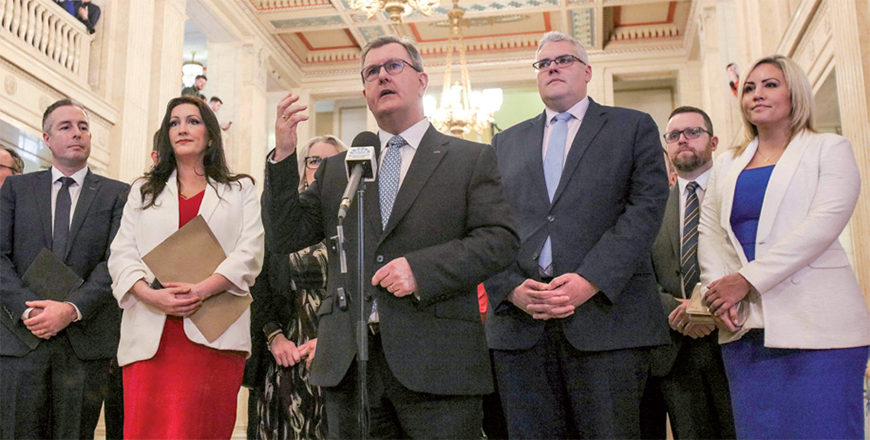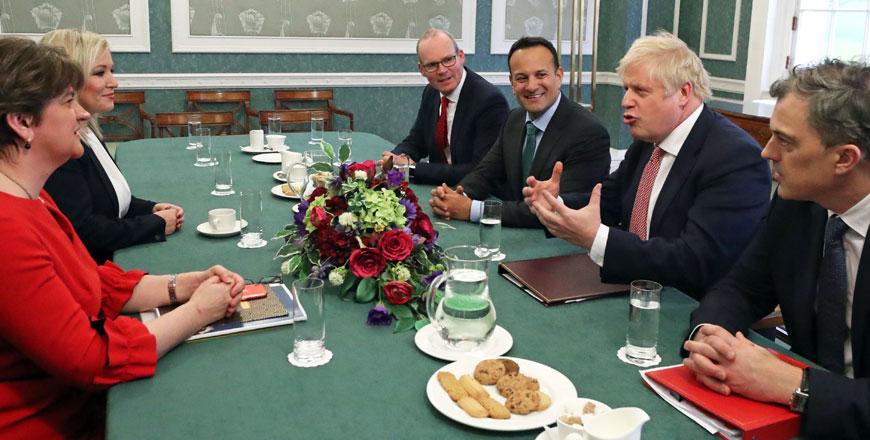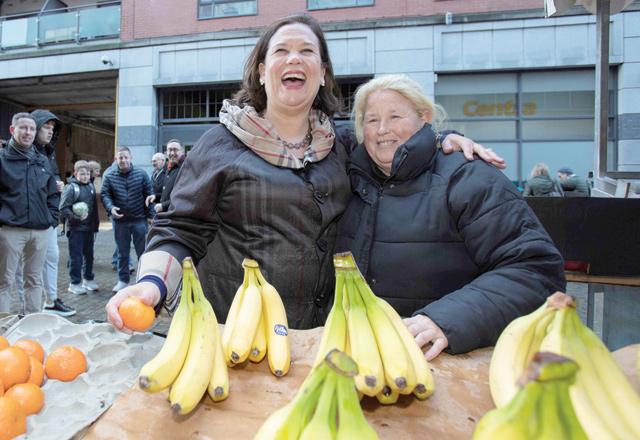You are here
N. Irish lawmakers return to power-sharing after two-year hiatus
By AFP - Feb 03,2024 - Last updated at Feb 03,2024

Northern Ireland Democratic Unionist Party leader Jeffrey Donaldson (centre) speaks to press on the great hall of the Parliament Building of the Northern Ireland Assembly, in Stormont on Saturday as the Northern Ireland Assembly prepares to sit and elect a Sinn Fein first minister of Northern Ireland (AFP photo)
BELFAST — Northern Ireland's lawmakers on Saturday restored its devolved assembly after a two-year hiatus, paving the way for a power-sharing government led for the first time by a pro-Irish unity nationalist.
In a special sitting to restart the Northern Ireland Assembly after the biggest pro-UK party ended its boycott, lawmakers were set to nominate Sinn Fein's Michelle O'Neill as first minister in a historic step for the UK territory.
The session, which follows the Democratic Unionist Party (DUP) ending its walkout after striking a deal with the UK government over post-Brexit trade rules, will also see a deputy first minister and other ministers appointed.
Under the 1998 Good Friday or Belfast Agreement that ended three decades of sectarian violence over British rule in Northern Ireland, the first minister and deputy first minister posts are equal.
But the appointment at the Stormont assembly of a Roman Catholic pro-Irish unity first minister in a nation set up as a Protestant-majority state under British rule is hugely symbolic.
It not only reflects Sinn Fein's position as Northern Ireland's biggest party but also shifting demographics, since the island of Ireland was split into two self-governing entities in 1921.
"This is an historic day. It is about the future," O'Neill said on X, formerly Twitter, hours ahead of her swearing-in.
"As a First Minister for All, I am determined to lead positive change for everyone, and to work together with others to progress our society in a spirit of respect, cooperation, and equality."
'Optimism'
O'Neill takes office facing the pressing problem of fixing budgetary constraints and crumbling public services that have sparked widespread industrial disputes in Northern Ireland.
On Monday, she called the restoration of the assembly “a day of optimism” and urged a joint effort to tackle the problems.
The 47-year-old has been first minister-designate since May 2022, when Sinn Fein became the largest party at elections for the 90-seat assembly, which has responsibility for domestic policy areas when sitting.
But she had been unable to take up the role because of the boycott of the assembly by the DUP.
Northern Ireland shares the UK’s only land border with the European Union, with the Republic of Ireland to the south, but under the 1998 peace accord it needs to be kept open, without infrastructure.
London struck a separate Brexit trade pact with Brussels over Northern Ireland which mandated port checks on goods arriving there from mainland Britain, England, Scotland and Wales.
Unionists, though, said that effectively keeping only Northern Ireland in the EU single market and customs union risked cutting it adrift from the rest of the UK, and made a united Ireland more likely.
‘Surrender deal’
After two years of protracted negotiations, the DUP has returned to power-sharing, striking a deal with London this week which will ease routine checks on goods crossing the Irish Sea destined to remain in Northern Ireland.
The UK government will release a £3.3 billion ($4.2-billion) package to bolster struggling public services there, after a series of strikes in recent weeks over pay.
“Today is a good day for Northern Ireland, a day when once again our place in the United Kingdom and its internal market is respected and protected,” DUP leader Jeffrey Donaldson said at Stormont.
Saturday’s formalities began with the election of a neutral Speaker, followed by nominations for the parties entitled to jointly lead the decision-making executive, and ministers for nine departments.
The non-aligned third-biggest party, Alliance, has said it will be willing to take the justice portfolio again, and is eligible for another ministry.
The smaller Ulster Unionists are also entitled to a ministerial position but the fifth-largest party, the nationalist SDLP, are not and will form the opposition.
However, smaller, more hardline unionists remain bitterly opposed to Stormont’s return, arguing the “surrender deal” changes nothing.
“We will not be surrendering our land to the EU,” pro-UK activist Mark McKendry told fellow loyalists Thursday, calling on them to “mobilise” in protest.
But others are backing the agreement.
Former first minister and ex-DUP leader Peter Robinson said it secures “very substantial” progress on safeguarding the union, in a video message shared Saturday by the party.
Related Articles
BELFAST — New Prime Minister Keir Starmer on Monday wrapped up a whistlestop tour of the UK, promising Northern Ireland's leaders "a differe
BELFAST — British Prime Minister Boris Johnson promised a "bright future" for Northern Ireland on Monday as he visited Belfast to mark the r
DUBLIN — Sinn Fein called on the European Union on Tuesday to back its bid for a united Ireland after a surge in support saw it become the s

Opinion
Apr 09, 2025
Apr 08, 2025
- Popular
- Rated
- Commented
Apr 08, 2025
Apr 09, 2025
Newsletter
Get top stories and blog posts emailed to you each day.
















